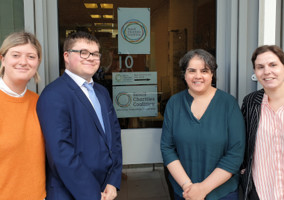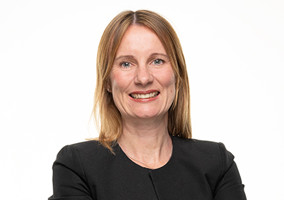When Helen Walker joined Carers UK just over a year ago she sat down with every member of staff to hear what they did, and importantly what they did not like about the organisation, as well as to discover what people’s secret talents were.
The exercise, she says, has helped her to gain an understanding of what the charity’s strengths and weaknesses are as she begins work on its next strategy, prepares to celebrate its 60th anniversary and looks to raise its profile.
In the first three months she sat down for half an hour with every member of staff and asked them the same four questions: What's the best thing about working working at Carers UK? What's the worst thing? How would you describe Carers UK externally? And what is the first thing you'd change?
“I got a whole range of answers that helped me to see where we were at as an organisation, but it also enabled me to get to know the staff team a bit better,” she says.
She also wanted to find out what people’s “secret skill sets” were. “So if I need someone who speaks Swahili, who in the organisation do I go to? Who has those secret, kind of hidden, talents?”
‘As the CEO you have to really believe in the cause’
Walker had been the chief executive at volunteering charity TimeBank for a decade before moving to Carers UK, and was “very much ready for a new challenge”.
But being a charity chief executive is about more than a job for her. As the figurehead of the organisation, “you have to be the person who stands hand on heart and believing in your cause,” she says. “I knew it had to be something I genuinely and personally cared about.”
It helped that she already knew a bit about Carers UK, having worked with them on a project while at Timebank, but she also had a personal connection to the cause.
For about eight months she had travelled to her parents’ home in South West Scotland to help care for her father in his final months.
“It wasn't like some of our carers that are doing it for years and years and years,” she says, “but I don't think that takes away from the intensity of the moment”.
“Having had that experience I think I absolutely 100 per cent felt that it was something I could care about - carers deserve better than they currently get.”
One of the initial challenges for Walker was getting up to speed with the facts and figures to be able to go into meetings and make the charity’s case.
“I had been in post for ten years and you forget what it's like to be the new kid on the block, you forget what it's like to not have all that knowledge at your fingertips,” she says.
Carers UK is coming up to the last year of a five-year strategy, so she has a year to do a strategic review before beginning the next strategy period in April 2021.
Tough times for fundraising
Walker’s background is in fundraising, and she says one of her early tasks was to take a closer look at this area because raising enough money is fundamental to “enabling us to be as ambitious as we want to be”.
A new fundraising director, Laura Doughty, joined at the end of 2018, and together they have reviewed Carers UK’s income streams and identified corporate fundraising as a potential growth area.
Walker also plans a more focused approach to legacy giving, which she says has “always been really positive” without having a formal legacy campaign.
“That's not an overnight,” she says, “but actually you've got to start sometime, so you may as well start straight away because at some point that will come to fruition.”
Her aim is to grow the charity’s income in a sustainable way to meet rising demand. At the moment Carers UK’s income is around the £3m mark, with just over half coming from voluntary sources.
But, in common with many other charities, Carers UK is expecting demand to increase at a time when there are increased pressures on its funding.
“Fundraising is one of the biggest challenges,” Walker says. “In my 25 years in the sector I don't think I have ever worked in such a challenging political and economic climate, and I think that goes across the organisation, but I think you start with fundraising.”
This means that there is more competition for available funding.
“I think we're all fishing in ever smaller pools and more people are fishing in those pools as income streams decrease,” she explains.
“There's no local government funding any more, and central government funding - who knows. So everyone is looking at the Lottery, everyone is looking at trusts and foundations and companies, so it's more competitive.”
Identifying as carers
Another big challenge is getting people to actually realise that they’re carers. Often it’s something people slip into, but if they identify as being a carer then it's easier.
A lot of the time, the solution is having flexible working options readily available.
Achieving this involves getting employers to put more support in place for carers in their workforce. There’s a “very simple business case” for this, Walker says, because it is more often the more senior and experienced staff who find themselves needing to take care of a partner or elderly relative, and those are the people businesses don’t want to lose.
As a charity, Carers UK it has a strong record of getting the government of the day to listen. And in 2020, it is determined to hold the prime minister to promises he made about sorting out social care.
But the charity also has some clearly defined policy asks, including making it a requirement for employers to provide paid care leave, increasing statutory carers’ allowance in England and Wales so that it is in line with that in Scotland, and having local authorities provide better respite breaks.
‘Charities should be leading the way’
Walker is keen to scale up the number of partnerships that Carers UK has with other charities, and is looking towards the “unusual suspects”.
“It's about identifying groups who perhaps aren't the usual suspects where you know that there are a huge number of carers,” she says, in order to try and avoid “duplicating work”.
Carers UK can, for example, work with a health charity to help them work through their cause-specific caring challenges.
She’s also looking towards benevolent funds, where Carers UK can use its network of carers help them find their beneficiaries, and help their beneficiaries recognise that they themselves are carers.
Walker would also like to see the rest of the sector “leading the way” when it comes to promoting a flexible working environment for their own staff.
Carers UK offers staff 10 days of paid care leave. “You would expect us to be at the top end,” she says, but urges other charities to be loud and proud of the flexible working opportunities in the sector.
“[Charities should] recognise that they have carers working within their organisations that perhaps couldn't work in another organisation because they wouldn't have that flexible working environment,” she explains, and that “we should be leading the way and showing the value that that has”.
Being accessible to carers of the future
The next strategy will take Carers UK to its 60th anniversary.
“That's quite a pivotal moment where you look at yourselves as an organisation, what you have achieved in the last 60 years, what you want to achieve and where you want to go. So it gives us a real focus for the future and it's quite exciting to have that end point,” Walker says.
On the wall opposite her desk is a poster of the charity’s timeline. It reminds her that the charity was “set up by women ahead of their game”, who were frustrated at society’s expectation that single women should forgo their own ambitions to look after elderly relatives.
There is still a gender inequality when it comes to caring. Women have a 50:50 chance of becoming a carer by the time they are 46, whereas for men it is 57, which she describes as “extraordinary” in 2020.
So for Walker it will be about “looking back and seeing what we have managed to achieve as an organisation”, and then “making sure that we continue to take it to the next level”.
Looking to the future, she is thinking about “what kind of advice information and support the carer of the future will want”.
Carers UK is planning to launch a new website later this year.
“That is where more people seek advice now than they did in the past, and so we need to make sure it is accessible in every context of the word,” she says. She is also hoping the new site will “support people not just with the practical side but also a little bit more with the emotional side of the kind of support that you need as a carer”.
It also entails doing more to understand the “evolution of the carer” in the context of an ageing population.
“What does that mean in terms of what a carer looks like across this country? And is that going to change? If it is we need to be future-proofing our organisation to be fit for purpose,” she says.
|
Related articles













